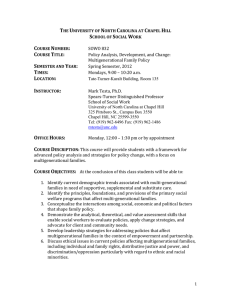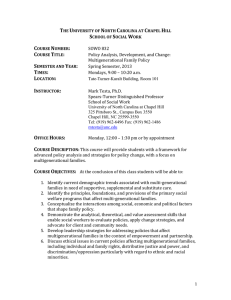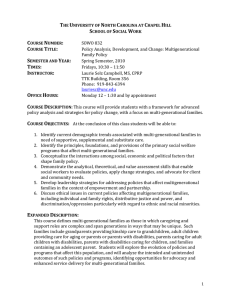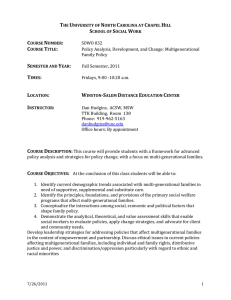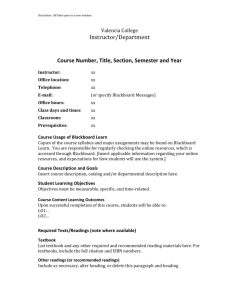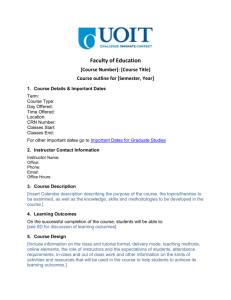T U N C
advertisement
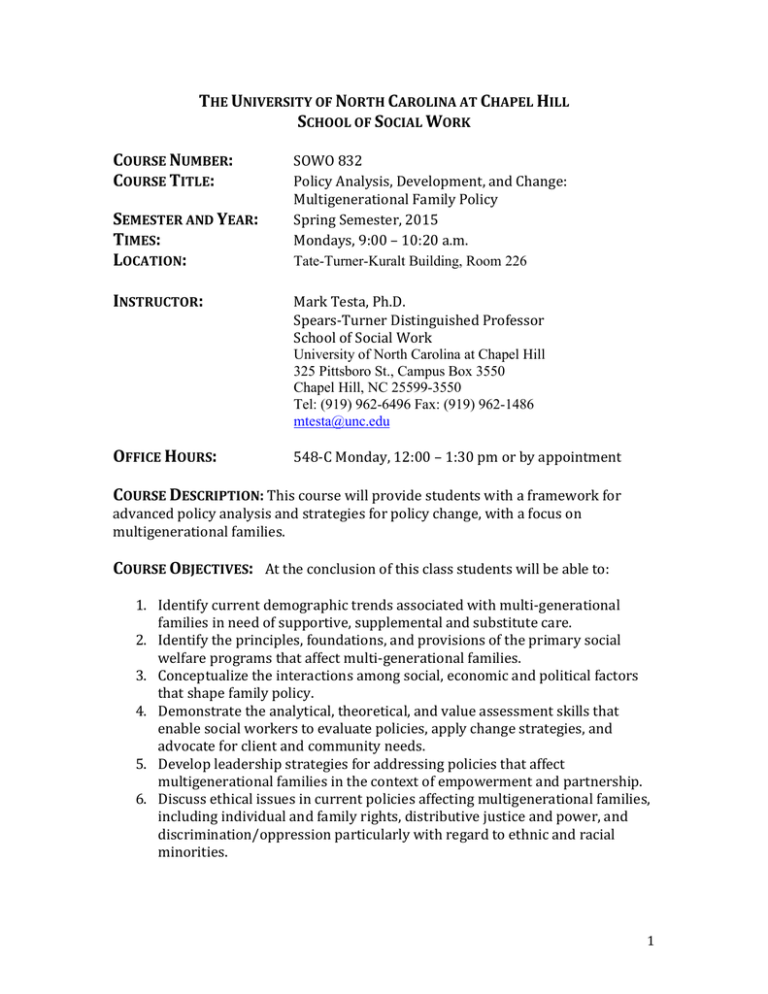
THE UNIVERSITY OF NORTH CAROLINA AT CHAPEL HILL SCHOOL OF SOCIAL WORK COURSE NUMBER: COURSE TITLE: SEMESTER AND YEAR: TIMES: LOCATION: SOWO 832 Policy Analysis, Development, and Change: Multigenerational Family Policy Spring Semester, 2015 Mondays, 9:00 – 10:20 a.m. Tate-Turner-Kuralt Building, Room 226 INSTRUCTOR: Mark Testa, Ph.D. Spears-Turner Distinguished Professor School of Social Work University of North Carolina at Chapel Hill 325 Pittsboro St., Campus Box 3550 Chapel Hill, NC 25599-3550 Tel: (919) 962-6496 Fax: (919) 962-1486 mtesta@unc.edu OFFICE HOURS: 548-C Monday, 12:00 – 1:30 pm or by appointment COURSE DESCRIPTION: This course will provide students with a framework for advanced policy analysis and strategies for policy change, with a focus on multigenerational families. COURSE OBJECTIVES: At the conclusion of this class students will be able to: 1. Identify current demographic trends associated with multi-generational families in need of supportive, supplemental and substitute care. 2. Identify the principles, foundations, and provisions of the primary social welfare programs that affect multi-generational families. 3. Conceptualize the interactions among social, economic and political factors that shape family policy. 4. Demonstrate the analytical, theoretical, and value assessment skills that enable social workers to evaluate policies, apply change strategies, and advocate for client and community needs. 5. Develop leadership strategies for addressing policies that affect multigenerational families in the context of empowerment and partnership. 6. Discuss ethical issues in current policies affecting multigenerational families, including individual and family rights, distributive justice and power, and discrimination/oppression particularly with regard to ethnic and racial minorities. 1 EXPANDED DESCRIPTION: Many of the policy issues affecting multigenerational families pose the problem of where to draw the boundary between public and private care: Should the public subsidize children's formal foster care by grandparents or should they be expected to assume informal care of their dependent grandchildren on their own? Should the government compensate adult children for the care of their frail elderly parents or should they be held financially liable for the support of adult family members? Should the state support adolescent parents to finish school or obligate them to enter the paid labor force to support their children? The choices over how much of the care of dependent family members by legally and nonlegally liable relatives should be absorbed within the multigenerational family, purchased privately in the market, or provided by the state are at the core of many key social policy dilemmas, such as the long-term care of the frail elderly, the social support of adolescent parents, and the kinship care of neglected and abused children. Confronting these choices remains one of the critical domestic policy challenges of the early 21st century. This course defines multigenerational families as those in which caregiving and supportive roles extend beyond the two-generation, nuclear family, including parents (or in-laws) and adult children; parents (or in-laws), adult children (and spouse or children in law), and grandchildren; and grandparents and grandchildren without co-resident parents. Caregiving and supportive roles encompass adult children’s providing care for frail elderly parents; parents’ caring for adult dependents with chronic disabilities; families containing an adolescent parent and her or his children; grandparents’ providing kinship care to grandchildren; and parents with chronic disabilities caring for children. Students will explore the evolution of policies and programs that affect multigenerational families as well as controversial laws and regulations that inhibit the formation of particular family forms, such as prohibitions against foster care and adoption by lesbian and gay couples and the sterilization of persons with intellectual disabilities. The course will analyze the intended and unintended consequences of multigenerational family policies and programs as well as identify opportunities for enhanced service delivery, policy advocacy, and restorative justice. REQUIRED READINGS: Required readings (articles and selected book chapters) will be posted on Sakai. TEACHING METHODS Teaching methods will include lecture and class discussion, as well as multimedia presentations, case scenarios, and small group activities. My perspective is that we all have much to learn and much to teach. Full engagement is essential to your learning process in the class, and will allow you 2 to apply successfully the course material in a way that is personally and professionally meaningful. POLICY ON CLASS ATTENDANCE AND PARTICIPATION: Students are expected to attend every class and come prepared to share concepts from the readings, ask questions, and respond to questions about the materials. If you should need to miss a class session for any reason, e-mail me your reasons for missing class prior to the day of the session. An unexcused class absence may result in a loss of points from your grade for active participation (see Grading Components below). Any student who foresees difficulty with fulfilling the class attendance requirements should speak with me at the beginning of the semester so that alternative forms of participation can be arranged. POLICIES ON THE USE OF ELECTRONIC DEVICES IN THE CLASSROOM: I expect that we will all be invested in creating a learning environment of respect and engagement. I welcome the use of laptops in class for taking notes or completing small group tasks. However, I ask that you use them only for relevant activities – not for checking email or surfing the Web. During class, cell phones and other devices should be silenced. ACCOMMODATIONS FOR STUDENTS WITH DISABILITIES: Students with disabilities that affect their participation in the course should notify the instructor if they wish to have special accommodations in instructional format, examination format, etc., considered. Accommodations and services are provided by Disability Services (Voice/TDD 962-8300; 966-4041). Learning Disability Services (962-7227) provides supportive services for students with learning disabilities and attention-deficit/hyperactivity disorders. POLICY ON ACADEMIC DISHONESTY: Academic dishonesty is contrary to the ethics of the social work profession, unfair to other students, and will not be tolerated in any form. All written assignments should include the following signed pledge: “I have neither given nor received unauthorized aid in preparing this written work.” Omission of a statement to this effect will result in the return of your assignment without a grade. It’s OK to receive help as long as you acknowledge the assistance in your signed pledge, e.g., “I have received editorial aid in preparing this written work.” In keeping with the UNC Honor Code, if reason exists to believe that academic dishonesty has occurred, a referral will be made to the Office of the Student Attorney General for investigation and further action as required. Please refer to the APA Style Guide for information on attribution of quotes, plagiarism, and appropriate citation. POLICY ON INCOMPLETES AND LATE ASSIGNMENTS: Late assignments are strongly discouraged, but may be accepted in some cases. All assignments are due at the beginning of class on the day noted. You must 3 contact me prior to a due date if you would like to request an extension, or you will lose 10% of the assignment’s points per day (including weekends and the date on which the assignment was due, if submitted after the beginning of class). Incompletes may be granted if (a) there are extreme and unforeseeable circumstances that affect your ability to complete the semester’s work, and (b) you meet with me in advance to develop a plan and timeline for completing your work. ASSIGNMENT GUIDELINES: All written assignments must be typed and follow APA format. Several writing resources are posted on the SSW website. You can also refer to the APA Publication Manual (6th edition), and to http://www.lib.unc.edu/instruct/citations/apa/index.html. ASSIGNMENT DESCRIPTIONS: Descriptions of the course assignments are below. As needed, we will discuss further guidelines and resources as we move through the semester. Assignment 1: Class Elective Exercise Due February 16 You will each prepare a 1-page (single-spaced) proposal with an associated set of readings pertaining to a special topic on multigenerational families. These topics may include issues related to multigenerational families, such as kinship care, elder abuse, emerging adulthood, feminist perspectives and the like. The proposals will be circulated and voted on by the class on February 23 to decide which two should be selected for the class elective sessions on March 23 and April 6. You should be prepared to argue for your proposal, including a brief justification of the importance of the issue and why it deserves a special place on the federal, state or local policymaking agenda. These proposals should be submitted electronically on Sakai to the instructor before midnight February 15/16 for distribution to the class a week in advance of the class elective exercise. Assignment 2: Group Assignment March 23 and April 6 Student groups of four will be assigned to assist the winning class elective teams in organizing the class sessions during weeks 11 and 13. Each group will be led by the authors of the winning proposals, who will assign each team member to one of the following tasks: 1) scholarly research review that provides a narrative summary of a minimum of four (4) scholarly sources (peer-reviewed research articles, reports from government websites, or reports from “think tanks”) on the elective topic; 2) background and ethical analysis that summarizes why this topic merits consideration at this time and what specific ethical principles are promoted or thwarted; and 3) policy recommendations and discussion that summarize the policy 4 interventions or programmatic changes the team recommends and how the nonrational policy approaches discussed by O’Connor & Netting (2010) might inform your messaging of these recommendations? These three products will be presented at the special elective sessions that can be organized in any form that the team leaders deem would be most effective in communicating why the topic is relevant to multigenerational family policy. The sessions may take the form of PowerPoint presentations, small-group exercises, simulations, or some combination as well as other types of learning activities. Assignment 3: Multigenerational Family Policy or Program Analysis Due April 21 This assignment asks you to complete a systematic analysis of a program or policy related to multigenerational families using the policy practice and advocacy framework outlined by Jansson (2011) in Week 6’s reading. Your analysis shall incorporate: (a) scholarly research using a minimum of four (4) scholarly sources (peer-reviewed research articles, reports from government websites, or reports from “think tanks”) and (b) first-person reflections and insights from a service provider or a service recipient (these can come from in-person interviews or from online sources, depending on feasibility and logistics. Your analysis should specifically address the following: 1. Background (One page) - Policy name and description. - The importance of the policy. - The stakeholders involved—policy beneficiaries and policy losers; see Schneider and Ingram (1993) in Week 6’s reading. - Summary of the historical, social, political, or economic factors that clarifies why this policy merits consideration at this time. 2. Deciding what is right and wrong (Two pages) - What specific ethical principles (e.g. autonomy, personal achievement, health, safety, equality, and communal solidarity) are promoted or thwarted by the policy? Are there any inherent dilemmas (competing or contradictory ethical principles)? - Does the policy operate in a way that promotes social justice, or does it contribute to oppression and/or discrimination? 3. Choosing where to focus attention (One-half page) - Should the program or policy concern be addressed at the local, state, or federal level? - Should the focus be on the policies of a specific organization, domestic public policies, or policies in international venues? 5 4. Gauging the political salience of the policy or program: (Two pages) - Who might see this policy or program as desirable or undesirable? Are any particular agendas favored or disfavored? - What reflections or insights have you obtained from a service provider or service recipient about the conditions favorable for consideration of the policy or program at this time? 5. Assessing the evidence in support of or opposed to the policy or program (Two pages) - What (if any) research has been conducted on the causes and nature of specific problems and their prevalence and location? - What analyses have been done on the efficacy and effectiveness of the policy or program? Is the evidence consistent? - What is the quality of the research? Are findings generalizable to relevant populations? 6. Recommending policy interventions and programmatic changes (One-half page) - What policy interventions or programmatic changes do you recommend taking to address the concerns or problems identified above? - Will the focus be on how the policy or policy is implemented in practice or on what underlying assumptions and theory of action ought to be changed? 7. Discussion and Conclusion (Two pages) - What are the limitations of Jansson’s (2011) rational approach to policy practice and advocacy for implementing your recommended policy interventions and programmatic changes? - How might the nonrational policy approaches discussed by O’Connor & Netting (2010) inform how you message and evaluate your recommendations? - What is your one-sentence summary conclusion? Your paper should be about 10 double-spaced pages long (excluding tables, charts and references). SUMMARY OF COURSE EVALUATION COMPONENTS AND GRADING SCALE: Grades will be assigned based on the following components and weights: Active Participation 10 Class Elective Exercise 25 Group Assignment 25 Policy or Program Analysis 40 Total 100 94 – 100 = H 80 - 93 = P 70 – 79 = L <70 =F 6 COURSE OUTLINE Date Topic & Readings Week 1 Jan 12 Introduction to Course Week 2 Jan 19 No Class (University Holiday) Week 3 Jan 26 Emergence of the Modern (Two-Generation) Family Week 4 Feb 2 Spread of the Multigenerational (Accordion) Family Assignments due Required Reading: Dizard, J. E. & Gadlin, H. (1990). The minimal family. Amherst, MA: The University of Massachusetts Press, pp. 3-65. Required Reading: Newman, K.S. (2012). The accordion family: Boomerang kids, anxious parents, and the private toll of global competition. Boston: Beacon Press, pp. 37-62. Asma, S. (2013). The myth of universal love. Opinionator. The New York Times, January 5, pp. 1-6. Week 5 Feb 9 The Enduring Significance of Multigenerational Bonds Required Reading: Putney, N.M., Bengston, V., & Wakeman, M.A. (2007). The family and the future: Challenges, prospects, and resilience. In Pruchno, R.A. & Smyer, M.A. (Eds.), Challenges of an aging society: Ethical dilemmas, political issues (pp. 117-155). Baltimore: The Johns Hopkins University Press. England, P., Folbre, N., & Leana, C. (2012). Motivating care . In Folbre, N. (Ed.), For love and money: Care provision in the United States (pp. 21-39). New York: Russell Sage Foundation. 7 Date Week 6 Feb 16 Topic & Readings Policy Practice and Theoretical Perspectives Required Reading: Jansson, B. S. (2011). Becoming an effective policy advocate: From policy practice to social justice. Belmont, CA: Books/Cole, pp. 79-87. Assignments due Special Topic Proposals Due Supplemental Readings: O’Connor, M.K. & Netting, F.E. (2010). Analyzing social policy: Multiple perspectives for critically understanding and evaluating policy. Hoboken, NJ: Wiley. Chs. 4 & 6. Kahan, D. K. (2012). Cultural cognition as a conception of the cultural theory of risk. In S. Roeser, R. Hillerbarnd, P. Sandin & M. Peterson (Eds.), Handbook of Risk Theory (pp. 726-759). New York: Springer. Schneider, A. & Ingram, H. (1993). Social construction of target populations: implications for politics and policy. The American Political Science Review, 87(2), 334-347. Week 7 Feb 23 Class Elective Exercise Week 8 Mar 2 Caring for Adult Dependents with Chronic Disabilities Week 9 Mar 9 No Class (Spring Break) Week 10 Mar 16 Parents with Intellectual Disabilities Required Reading: Class Elective Proposals Required Reading: Hooyman, N.R. & Gonyea, J. (1995). Feminist perspectives on family care: Policies for gender justice. Thousand Oak, CA: SAGE Publications, pp. 183-209. Required Readings: Woodside, M. (1950). Sterilization in North Carolina: A sociological and psychological study. Chapel Hill: The University of North Carolina Press, pp. 96-114. Reader Advisory: The above reading is a historical document that uses language contrary to NASW guidelines for writing about people. It reflects the language of the time in which it is written and should be read with this advisory in mind. 8 Date Topic & Readings Assignments due IASSID Special Interest Research Group on Parents and Parenting with Intellectual Disabilities. (2008). Parents labeled with intellectual disability: Position of the IASSID SIRG on parents and parenting with intellectual disabilities. Journal of Applied Research in Intellectual Disabilities, 21: 296–307. Week 11 Mar 23 Special Topic Electives Session I Week 12 Mar 30 Support and Care of Adolescent Parents Start of Group Assignments Required Readings: Testa, M. F. (1992). Racial and ethnic variation in the early life course of adolescent welfare mothers. In M.K. Rosenheim & M.F. Testa (Eds.), Early parenthood and coming of age in the 1990s (pp. 89112). New Brunswick, NJ: Rutgers University Press. Haight, W., Finet, D., Bamba, S. & Helton, J. (2008). The beliefs of resilient African-American adolescent mothers transitioning from foster care to independent living: A case-based analysis. Children and Youth Services Review, 31: 53-62. Week 13 Apr 6 Special Topics Elective Session II Week 14 Apr 13 Kinship Foster Care Required Readings: Testa, M. F. (1997). Kinship foster care in Illinois. In J. Duerr Berrick, R. Barth & N. Gilbert, N. (Eds), Child welfare research review, volume two (pp. 101-129). New York: Columbia University Press. Testa, M., Bruhn, C. & Helton, J. (2010). Comparative safety, stability, and continuity of children’s placements in informal and formal substitute care arrangements. In M.B. Webb, K. Dowd, B.J. Harden, J. Landsverk & M.F. Testa (Eds.). Child welfare and child well-being: New perspectives from the National Survey of Child and Adolescent Well-Being. New York: Oxford University Press. Week 15 Apr 21 Foster Care and Adoption by Lesbian and Gay Couples Required Reading: Mallon, G.P. (2006). Lesbian and gay foster and adoptive parents. Washington, DC: CWLA Press, pp. 2-4, 7-12, 29-44, 91-96. Policy or Program Analysis Due 9
